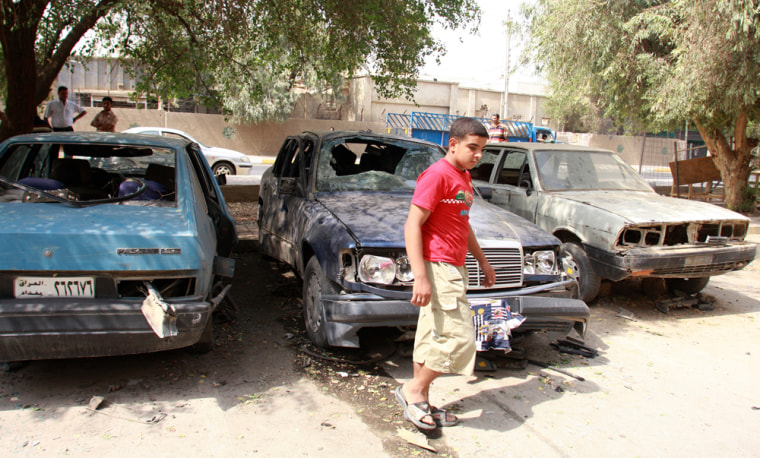An Iraqi journalist for one of the Middle East's best-known satellite television stations escaped assassination Tuesday when a bomb was found under the seat of his car as he prepared to leave home for work.
The attempt against Jawad al-Hattab, Baghdad bureau manager for Al-Arabiya television, illustrates the dangers facing Iraq despite the decline in violence.
President Bush cited those dangers when he announced Tuesday that he would keep U.S. troop strength mostly intact through 2008.
Al-Hattab's driver and a security guard discovered the laptop-sized bomb as they waited to pick up the correspondent at his home in central Baghdad, according to the station's executive editor Nabil Khatib.
The two moved away from the car and summoned police but the device exploded before they arrived, heavily damaging the vehicle and setting it on fire, Khatib said.
"It appears that it was timed to explode while al-Hattab was driving to the office," Khatib said, calling the blast "an attempt on his life and an attack against the station."
Popular Arabic station
Al-Arabiya, based in Dubai, United Arab Emirates, is among the most popular Arabic TV news stations and has been criticized by Iraqi hard-liners who believe it is too pro-Western.
"Some (Web) sites describe us as renegades and collaborators with the Americans," said Al-Arabiya correspondent Majid Hameed, who was detained by the Americans in September 2005 and released without charge four months later.
The attempted bombing occurred as the Emirates' new ambassador to Baghdad, Abdullah Ibrahim al-Shehhi, took up his post — the first fully accredited Arab ambassador here since the ouster of Saddam Hussein's regime in 2003.
Small explosive devices concealed in cars have been increasingly used by Iraqi militants to target government employees and Iraqi military officials now that heightened security has made it difficult to mount major truck bomb attacks that were common a few years ago.
U.S. officials have urged the Iraqis to take advantage of the improved security to reach political agreements among rival Shiite, Sunni and Kurdish communities to ensure a lasting peace.
But political progress has lagged behind military gains against al-Qaida in Iraq and other militant groups.
On Tuesday, Iraqi lawmakers ended their summer break and convened their fall session under strong pressure to move on key issues such as provincial elections and regulating the oil industry.
Security pact in negotiations
Parliament must also ratify a security pact governing U.S. military operations once American and Iraqi negotiators finalize the agreement.
The session got off to a slow start. Parliament speaker Mahmoud al-Mashhadani opened it two hours late because not enough members showed up on time for a quorum.
In his opening remarks, al-Mashhadani called for streamlining the decision-making process, acknowledging the assembly had "shortcomings in the practice of democracy" and lacked "a spirit of accordance."
He asked leaders of the major parliament blocs to attend a meeting Wednesday on the election bill, which failed to win approval last month because of Kurdish objections to a power-sharing arrangement for oil-rich Kirkuk.
Kurds want Kirkuk incorporated to their self-ruled northern region but Arabs and Turkomen want the area to remain under central government control. The Kurds have also held up final approval of the oil bill, seen as crucial if Iraq is to attract huge foreign investment to exploit its petroleum resources.
Tuesday's session was held in the Baghdad Convention Center inside the U.S.-protected Green Zone, despite an announcement last June that the assembly would meet in the former National Assembly building outside the zone.
The decision to move to the new location was hailed as a sign of improved security and an affirmation of independence from the U.S.-led coalition. But security measures to protect the assembly building were not completed ahead of the fall opening.
Also Tuesday, the U.S. military released a camera operator for an Iraqi TV station, Omar Husham, 28, who was detained five days ago with his father in a Sunni area of Baghdad. Husham said he was questioned about insurgent activity but freed without charge.
